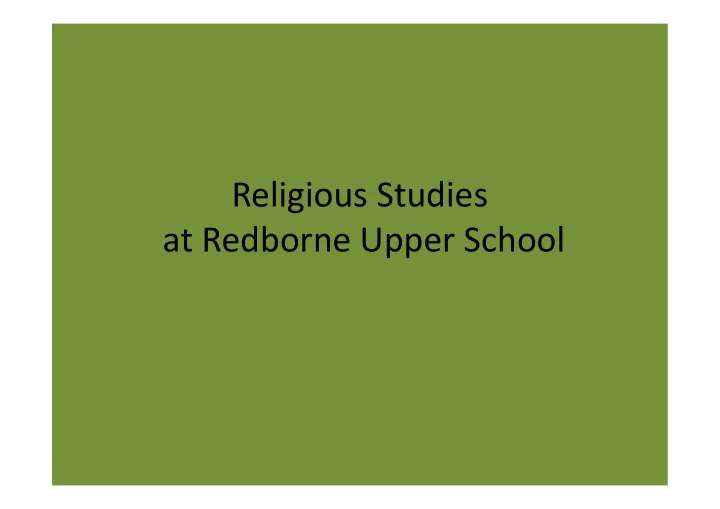

Religious Studies at Redborne Upper School
The curriculum Year 9 - 2 hours Religious Studies a fortnight, taught in form groups Year 10 and 11 core Ethical Thinking - 1 hour a fortnight, taught in mixed ability classes Year 10 and 11 GCSE option Philosophy and Ethics – 5 hours a fortnight Year 12 and 13 AS / A2 option Religious Studies – 10 hours a fortnight We have 4 full time RS teachers in the department
Statistics GCSE numbers • 30% of students opted for it in 2012 (102/334) • 44% in 2013 (156/351) • 25% in 2014 (96/371)(Ebac influence?) 6 th Form numbers • In 2014 24 students sat the A2 exam and 40 the AS
Year 9 • There will be nearly 390 students in year 9 in September 2014 in 14 form groups • They follow a scheme of work based on the Bedfordshire agreed syllabus • We focus on topics and skills that prepare them for the GCSE
Year 9
Case Study: Paul Jennings Hill An American Christian and murderer Year 9
“Religion is an insult to human dignity. Without it you would have good people doing good things and evil people doing evil things. But for good people to do evil things, that takes religion.” Steven Weinberg Year 9
Level Description Attainment Target 1 (AT1) Attainment Target 2 (AT2) Learning about religions and beliefs Learning from religions and beliefs I can describe some different examples of I can apply my knowledge of stereotypes of 4 stereotypes and discrimination Muslims and suggest answers as to how this I can use appropriate vocabulary to show an affects peoples lives understanding of what Islamophobia is As above and… I can describe why people might think all Muslims I can clearly express my own opinion on 5 are terrorists Islamophobia I can explain the impact of Islamophobia on British Muslims I can clearly explain why groups like the EDL exist and how Muslims have responded to them As above and… I can use the correct language to distinguish I can consider the challenges that Islamophobia 6 between different interpretations of Jihad poses for Muslim communities in the UK I can explain why the impact of Islamophobia on individual Muslims and Islamic communities may vary I can interpret arguments about the stereotyping of Muslims in the media and extremist groups and discuss the significance of this As above and… I can show a coherent understanding of the issues I can evaluate with insight the questions 7 and questions arising from Islamophobia surrounding the ethics of stereotyping minority I can account for the influence of history and ethnic / religious groups media culture on peoples prejudices and I can critically and personally evaluate the discrimination significance of different views about Muslims I can account for the differences between Muslims using appropriate evidence and examples in their response to Jihad and the example of Muhammad As above and… Year 9 I can analyse and critically evaluate a range of I can justify my view on a wide range of 8 opinions about Islam as a violent religion, or a viewpoints about Muslims and come to religion of peace comprehensive and balanced conclusions as to whether or not such views are dangerous unfounded stereotypes or valid opinions
Discover fascinating topics Gain valuable academic and life skills Earn a GCSE that’s highly respected at university and beyond
What is it? • Philosophy and Ethics is the GCSE offered by the RS department. • ‘Philosophy’ means ‘love’ of wisdom’. It is the study of life’s huge questions. • ‘Ethics’ is the philosophy of right and wrong. It questions human behaviour and the choices we make.
What skills? What you need…. • An enquiring, interested mind. • Some opinions. • The ability to explain them, in writing/verbally. What you’ll get…. • Thinking skills: evaluation, criticism, creating new ideas, thinking abstractly. • Skills in argument, discussion and debate. • Writing about complex, sometime sensitive issues. • Empathy.
Year 9
Year 9 Beth Shalom
Year 9 Holocaust Survivors
Poland. Auschwitz
GCSE Option • Students follow the OCR Religious Studies specification B – Philosophy and Ethics • It is a linear course (all assessed at the end of year 11) • There is no coursework or controlled assessment • They have 4 hours of exams, broken down into 4, 1 hour papers
GCSE Topics Philosophy Ethics • Deity • Equality • End of Life • Peace and Justice • Good and Evil • Relationships • Religion and Science • Medical Ethics
GCSE Key Questions Philosophy Ethics • Is there anything wrong • Is there a God? with casual sex? • Why do people suffer? • Is euthanasia ok? • Is science a better way • Should we bring back of looking at the world the death penalty? from religion? • Doesn’t everyone • Is there a life after deserve a second death? chance?
C
20/09/12 Test 26/09/12 HW C
R. Dawkins 74 C Over the next two lessons, practice active listening skills and follow the community of enquiry approach during discussion.
Peter Vardy
Ethical Thinking • This is studied by all students in years 10 and 11 • We follow the aims of the school and the Bedfordshire agreed syllabus
AS and A2 • Students follow the OCR Religious Studies specification in the 6 th form (Years 12 and 13)
Philosophy AS A2 • Religious Language • Ancient Greek influences on philosophy of religion • Judaeo-Christian influences on • Experience and Religion philosophy of religion • Traditional arguments for the existence • Nature of God of God Ontological Teleological • Life and Death Cosmological Moral • Challenges to religious belief. • Miracles Problem of Evil Religion and Science
Ethics AS A2 • Meta Ethics • Ethical theories: – Absolutism and Relativism • Free will and determinism – Utilitarianism – Natural Law – Deontology • Conscience – Christian Ethics • Applied Ethics: • Virtue Ethics Abortion, Euthanasia, Genetics, War • Applied ethics topics
Recommend
More recommend